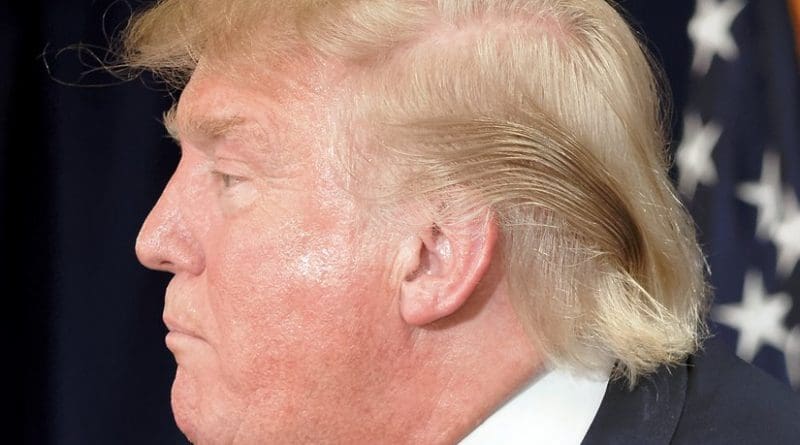Trump Applies Lessons Of Iraq Backwards – OpEd
By Mitchell Blatt*
A survey by the Charles Koch Institute and the Center for the National Interest is being touted as showing Americans want “restraint” in their foreign policy. According to the write up, 52 percent believe that U.S. foreign policy has made America less safe over the past 15 years, and twice as many want the U.S. to pull troops out of Europe compared to those who want to increase troop levels. (60 percent chose to keep troop levels the same or had no opinion.) Daniel DePetris a fellow at Defense Priorities, an organization that advocates for a “more prudent, restrained foreign policy that assesses the world as it exists,” writes this means “Americans want restraint.”
His view is supported by a growing trend towards anti-interventionist sentiment amongst Americans over the years, illustrated in Donald Trump’s campaign promises to renegotiate trade deals and demand changes to America’s defense treaty obligations with his allies, and playing down the threat of Russia—even to the point of denying that Russia hacked into the DNC’s and Hillary Clinton’s servers (while saying on the trail that Russia should hack Hillary’s server).
There’s one narrative about Barack Obama’s presidency that he intervened in too many countries—causing Libya to become destabilized, fueling war in Syria, and inflaming relations with Russia.
On the other hand, there’s another opposite narrative about Obama that Obama wasn’t interventionist enough. By staying out of Syria, ignoring ISIS until it was too late, and failing to see the threat of Russia (remember he would have more “flexibility” in dealing with Russia after his reelection, he told Dmitry Medvedev), he projected “weakness” and emboldened America’s enemies.
Donald Trump buys into both narratives. Even as Trump has put Article 5 defense of NATO allies into question, he has also called for “bombing the shit” out of ISIS in Syria and invading to steal Iraq and Syria’s oil. Barack Obama smartly didn’t send large numbers of ground troops to Syria or Iraq to get stuck in another quagmire. Trump has said about sending troops, “We really have no choice. … I would listen to the generals, but I’m hearing numbers of 20,000 to 30,000.”
The lesson in Iraq should be that wars in unstable Middle Eastern countries are rarely quick and easy. Trump has apparently not learned that lesson. Instead, he appears to buy into into the argument that Obama was “weak” for either not overthrowing Assad or not taking on ISIS with a ground war.
A related lesson should be to not overreact to terrorist attacks. For all the attention to ISIS, there have been no attacks directed by ISIS in the United States and only five attacks inspired by ISIS between October 2015 and July 2016, resulting in 53 of the more than 16,000 murder that occur in the country every year. The amount of Americans who would be killed directly in battle and indirectly as a result of massive American war in Syria could easily exceed the number killed by terrorism each year by many factors.
On the other hand, Trump takes the critique of Iraq and applies a broad “anti-interventionist” messages to parts of the world that are comparatively safe—namely Europe and Northeast Asia. Because Russia isn’t invading Poland, we should pull back from NATO. But America’s commitment to NATO hasn’t cost the U.S. anywhere near as much as its previous attempts to bomb the shit out of the Middle East and destroy terrorism have. NATO expansion, I have argued, unnecessarily lead to Russia feeling antagonized, and NATO countries could contribute more, but that implies reforms, not scraping the project. Trump’s plan amounts to pulling down your umbrella in a rainstorm because you’re not getting wet.
The American public is fickle and poll questions are not made for capturing nuance. Politicians will use any kind of argument they can think of to hit the other party; hence Republican House Majority Leader Paul Ryan praising Obama’s Russia sanctions while slamming him for doing too little, too late—while ignoring that his party’s leader wants even less to be done. The solution, then, isn’t a false choice between “intervention” and “restraint” but a smarter foreign policy. Trump, as it stands, espouses the wrong answers for both sides of the equation.
About the author:
*Mitchell Blatt moved to China in 2012, and since then he has traveled and written about politics and culture throughout Asia. A writer and journalist, based in China, he is the lead author of Panda Guides Hong Kong guidebook and a contributor to outlets including The Federalist, China.org.cn, The Daily Caller, and Vagabond Journey. Fluent in Chinese, he has lived and traveled in Asia for three years, blogging about his travels at ChinaTravelWriter.com. You can follow him on Twitter at @MitchBlatt.

